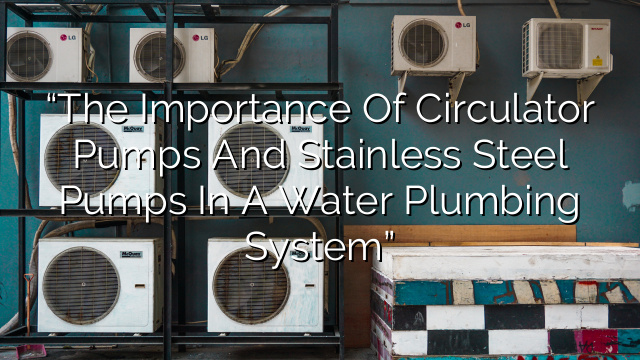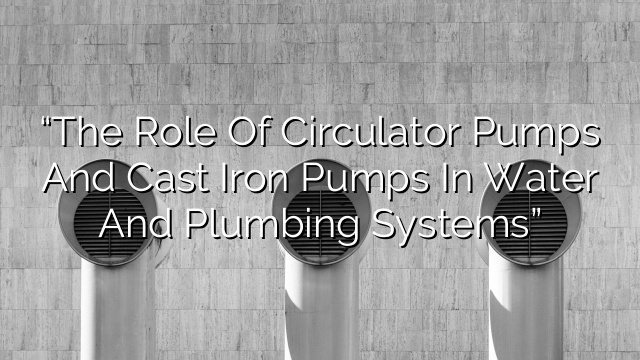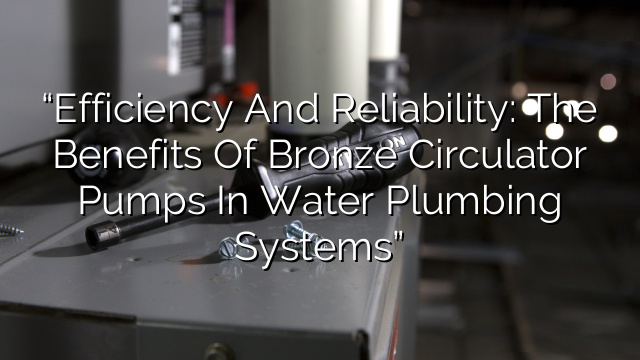When it comes to maintaining an efficient and reliable water plumbing system, two key components that play a crucial role are circulator pumps and stainless steel pumps. These pumps are designed to ensure the smooth and continuous flow of water throughout the plumbing system, providing numerous benefits in terms of convenience, energy efficiency, and longevity.
What are Circulator Pumps?
Circulator pumps, also known as recirculating pumps or circulating pumps, are installed in hot water heating systems to promote the efficient circulation of water. These pumps are typically used in residential homes, commercial buildings, and industrial facilities to keep the water in the plumbing system constantly moving, ensuring that hot water is readily available at any given moment.
Circulator pumps work by continuously circulating water through the pipes and back to the heating source, such as a boiler or water heater, using an impeller or propeller. This constant circulation helps to maintain a consistent temperature throughout the system, preventing cold spots and ensuring that hot water reaches every faucet or fixture quickly. It also reduces the wait time for hot water, saving time and water in the process.
Furthermore, circulator pumps can improve energy efficiency by reducing wasted energy and heat loss. By maintaining a continuous flow of water, these pumps eliminate the need for constantly reheating the water, saving energy and reducing energy costs. They also help to prevent the growth of bacteria and other contaminants that thrive in stagnant water, contributing to a healthier and safer plumbing system.
Benefits of Stainless Steel Pumps
Stainless steel pumps are widely used in various applications, including water plumbing systems, due to their exceptional durability, corrosion resistance, and hygienic properties. These pumps are designed to handle a wide range of fluids, including water, chemicals, and even aggressive or corrosive liquids, making them ideal for use in different environments.
One of the main advantages of stainless steel pumps is their resistance to corrosion. Unlike other materials, stainless steel is highly resistant to rust and other forms of corrosion, making it ideal for use in water plumbing systems. This means that the pumps can withstand exposure to moisture and harsh chemicals without deteriorating or affecting the quality of the water. Additionally, stainless steel pumps are easy to clean and maintain, ensuring a long lifespan and reducing the need for frequent repairs or replacements.
Stainless steel pumps also offer excellent hygienic properties, making them suitable for applications where sanitation is crucial. The smooth surface of stainless steel prevents the buildup of bacteria, biofilm, and other contaminants, reducing the risk of contamination and ensuring clean and safe water flow. This makes them particularly useful in domestic water systems, food and beverage production, and pharmaceutical industries.
The Connection Between Circulator Pumps and Stainless Steel Pumps
When it comes to water plumbing systems, circulator pumps and stainless steel pumps often work in conjunction to provide the best performance and reliability. Circulator pumps, as mentioned earlier, help to maintain a consistent flow of hot water throughout the system. Stainless steel pumps, on the other hand, are responsible for pumping water or other fluids throughout the plumbing system, whether it’s for supplying water to fixtures, transferring liquids in an industrial application, or boosting water pressure.
By combining these two types of pumps, water plumbing systems can benefit from the advantages of both. The circulation provided by circulator pumps ensures that hot water reaches every fixture quickly and consistently, while the durability and corrosion resistance of stainless steel pumps guarantee long-lasting performance and clean water supply.
FAQs
- Why are circulator pumps important in a water plumbing system?
- Circulator pumps help to maintain a constant flow of water, preventing cold spots and ensuring that hot water is readily available at any given time. They also improve energy efficiency and prevent bacterial growth in stagnant water.
- What are the benefits of stainless steel pumps in a water plumbing system?
- Stainless steel pumps are incredibly durable and resistant to corrosion, making them ideal for use in water plumbing systems. They also offer excellent hygienic properties, preventing the buildup of bacteria and contaminants.
- How do circulator pumps and stainless steel pumps work together?
- Circulator pumps ensure a consistent flow of hot water, while stainless steel pumps are responsible for pumping water throughout the plumbing system. Together, they provide efficient, reliable, and clean water supply.
- Where are circulator pumps and stainless steel pumps commonly used?
- Circulator pumps are typically used in hot water heating systems in residential, commercial, and industrial settings. Stainless steel pumps are widely used in water plumbing systems, as well as in food and beverage production and pharmaceutical industries.
- Why is stainless steel an ideal material for pumps in water plumbing systems?
- Stainless steel is highly resistant to rust and corrosion, making it well-suited for use in water plumbing systems. It is also easy to clean, offers excellent hygiene, and can handle a variety of fluids, including aggressive or corrosive liquids.



